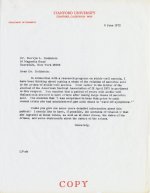|
Starting in the late 1960s, Pauling rigorously promoted vitamin C as a method to deter
the common cold and help cancer victims. Many medical professionals undermined Pauling's
claims and discredited his authority in medicine. These physicians noted that Pauling's
well-established reputation was in chemistry and peace (as his Nobel Prizes proved),
but not nutrition. In 1990, Pauling relayed his dismay that medical professionals
discredited his statements and mentioned the irony that the journal editors valued
his research on sickle cell anemia, but not on vitamin C and other nutrients: "Modern Medicine published an attack on me for a whole lot of things. I wrote to the man, the editor
of Modern Medicine and said, "You remember that Modern Medicine gave me the Modern Medicine Award four or five years ago for my work on sickle cell anemia? And here you are
attacking me."…I had been astonished by the medical profession, the response of the
medical profession to orthomolecular ideas."
Since many medical doctors undermined Pauling's concept of orthomolecular medicine,
Pauling regularly asked for more information about medical trials that failed to show
the benefits of orthomolecular therapies, especially vitamin C. Thus when Pauling
read a short statement written by Dr. Mervyn L. Goldstein of New York, which said
that vitamin C exacerbated the symptoms of a patient suffering from sickle cell-thalassemia
disease, Pauling wrote to Goldstein requesting information about his patient. Specifically,
Pauling wanted to know the amounts of vitamin C she had taken during sickness and
health, the dates of her sicknesses, and statements about the nature of the bouts
of sickness. If Goldstein replied, then the letter has not survived. Even so, less
than one week later Pauling acted on Goldstein's statement; he wrote a letter to a
colleague explaining that he wanted to research the effects of high doses of vitamin
C on sickle cell patients.
|
|
Click images to enlarge

Cartoon of Linus Pauling in the laboratory, by Sidney Harris. 1985.

Memorandum from Linus Pauling to Mervyn L. Goldstein. June 6, 1972.
"Many orthomolecular substances are so free from toxicity that they show beneficial
effects over a 10,000-fold range of concentrations. Yet if you take even ten times
the amount of aspirin that many patients take, for example, you’d be dead; hundreds
of people do die every year from aspirin poisoning. And all of the other major drugs
are highly toxic as well."
|

